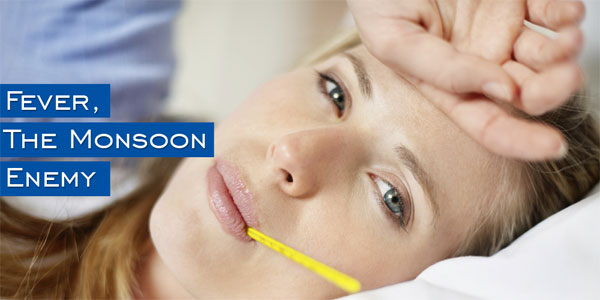Its pouring since the last two days incessantly. Every season we all eagerly await the rains but they have their own woes too, especially the different forms of fever.
While most are normal viral fevers, doctors are advising caution and adequate rest to ensure that things don’t get out of hand. The sudden change in climate accompanied by a variation between the day and night temperatures are to blame for the multiplication of viruses, resulting in flu and respiratory infections.
Some common types of Fever:
- Dengue fever
An acute viral infection dengue is acquired from the bite of a female Aedes aegypti mosquito at daytime. Symptoms include the sudden onset of high fever that may last from two to seven days, joint and muscle pains, skin rashes, nose bleeding, abdominal pain, and vomiting. - Leptospirosis
This is a bacterial infection from rodents and other vermin. This is commonly transmitted through rodent bites, contaminated food and exposure to flood with urine or faeces of infected animals. Apart from open wounds, the bacteria also enters the system through the eyes, nose and mouth. Fever, muscle pain, headache and reddish eyes are some of its symptoms. - Cholera
A serious intestinal infection transmitted by consuming food or drinking water filled with Vibrio cholerae, a bacterium usually found in human waste. This causes watery diarrhea and vomiting, leading to severe dehydration. - Influenza
Also known as flu, it’s a viral infection affecting those with weak immune systems. This affects the respiratory system and triggers chills, fever, sore throat, runny nose, coughs and fatigue. - Hepatitis A
An ancient disease of the liver it is known to be very infectious. This can be transmitted through food and water contaminated with faeces and urine from an infected patient. Abdominal discomfort, tiredness, dark urine and fever are few signs. - Typhoid
An acute illness caused by Salmonellae typhi bacteria from the faecal waste of a carrier. Infected people suffer from poor appetite, headaches, diarrhea and lethargy. - Chikungunya fever
This is caused by the same dengue virus mosquito, Aedes aegypti which bites during the day. It can cause severe, occasionally persistent, joint pain as well as fever and rashes. Specific antiviral drugs or vaccine for treatment of chikungunya fever aren’t available.
Some things to take care during Fever:
- To avoid infections to spread do not attend college, school or office.
- Complete rest is needed to cure with plenty of fluids, water and warm food.
- Consuming only boiled water is a must.
- Watch out for any unusual condition and get tested if fever persists.
- Guard yourselves and be protected from different illnesses preventable by vaccination.
- If going out is necessary, wear a facemask or cover your nose and mouth with a handkerchief in crowded places to avoid getting viruses.
- Avoid making contact with flooded areas especially when you have an open wound.
- Always feel free to get medical help without delay it he patient’s health deteriorates.
Kokilaben Dhirubhai Ambani Hospital functions with a FULL TIME SPECIALIST SYSTEM, which ensures the availability of specialists round the clock. Contact us anytime for emergencies and consultations We cater to all kind of patient issues minor and major. Please visit our website for further details:


